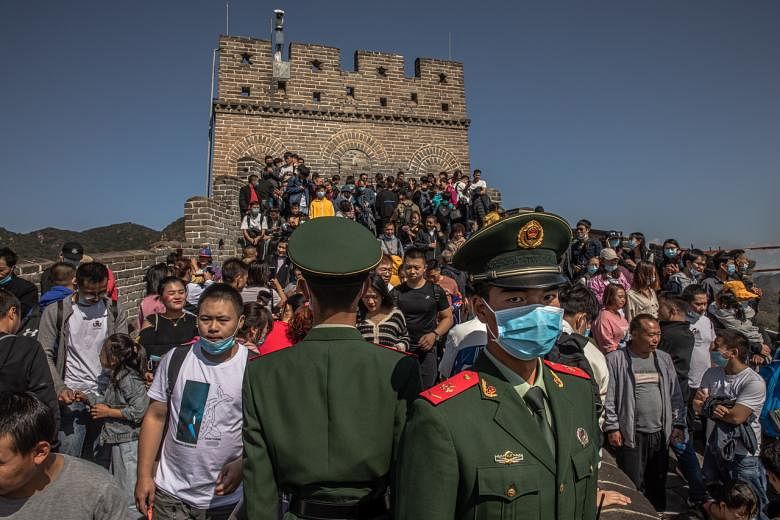In 2009, British author Martin Jacques published a bestselling book, When China Rules The World. Mr Jacques is now running a victory lap. He recently proclaimed that "we will remember 2020 as the moment of the Great Transition. The year when China replaced the US as the world's leading power".
Believers in a "great transition" see Covid-19 as the handmaiden of history.
The coronavirus pandemic started in China. But the Chinese government has done a much better job of containing the disease than the US.
According to Johns Hopkins University, the total number of deaths in the United States from Covid-19 stood at over 223,000 at the end of last week compared with 4,379 in China.
With the disease contained, the Chinese economy is rebounding and looks set to grow by 2 per cent this year, making it the only Group of 20 economy to expand. By contrast, the US economy is likely to shrink by 3 per cent to 5 per cent and the major European economies are in trouble.
China's ability to enforce quarantines and test widely is generally seen as crucial to the country's success in tackling the virus. At a recent ceremony to hand out medals to Chinese citizens for their work on Covid-19, President Xi Jinping announced that "the pandemic once again proves the supremacy of the socialist system with Chinese characteristics".
While the Chinese elite is patting itself on the back, the US establishment is aghast. The New England Journal Of Medicine recently noted in an editorial that "our leaders have failed... They have taken a crisis and turned it into a tragedy".
This scathing criticism of the Trump administration has not, however, led to the arrest of the editors of the journal.
By contrast, last month, Ren Zhiqiang, a property tycoon, was sentenced to 18 years in prison in China. Ren's fall from grace came after he published an aggressive criticism of Mr Xi's handling of the early stages of the pandemic, calling the Chinese leader a "bare, naked clown".
Shortly afterwards, Ren was stripped of his Communist Party membership and charged with corruption.
Some of the doctors who first raised the alarm about Covid-19, in private exchanges, in Wuhan, were notoriously reprimanded by the police.
External critics of China's handling of Covid-19 are also treated with ferocity. When the Australian government suggested an international inquiry into the pandemic, Beijing responded with trade sanctions.
The inability to accept criticism suggests that pro-Beijing triumphalism is premature.
In broad terms, there is not much doubt that China, after mishandling the initial outbreak, has done a good job of containing the disease. But some Asian democracies, such as South Korea and Taiwan, have done even better, which undermines Mr Xi's claim that China's "socialist system" was the key to success.
China's urge to suppress criticism also suggests that if there are continuing problems inside the country, Beijing will cover them up.
The pandemic has also significantly eroded international goodwill towards China.
It may be regarded as traitorous in China to highlight the origins of the disease - or to point out that the previous Sars epidemic also originated in China. But the outside world has noticed. A recent Pew opinion survey of 14 mainly Western nations showed 61 per cent thought China had done a bad job of handling Covid-19 and that distrust of Mr Xi has soared.
The international backlash compounds the challenges to the "China model" already created by Covid-19.
For 40 years, Chinese economic growth has been powered by trade. The country is the world's largest manufacturer and its largest exporter. But Covid-19 has seen a sharp reduction in world trading volumes. This is happening at a time when Washington is rallying international opposition to Beijing and curtailing trade in sensitive technologies.
As a result, the permissive international environment that powered the Chinese economic miracle is disappearing.
China's leadership is meeting this week to plan for the years ahead. But its ability to openly debate these problems is hampered by the thought-stifling cult of personality that has built up around Mr Xi.
Since taking power in 2012, the Chinese leader has purged many of his rivals, abolished constitutional term limits that would prevent him ruling for life, and forced the Communist Party to incorporate "Xi Jinping thought" into its Constitution.
This is no mere formality. On the contrary, government officials and even private companies are under constant pressure to praise the great leader's banal pronouncements. As a recent column for Bloomberg News pointed out, even China's weather forecasters and science fiction writers have been officially reprimanded for not doing enough to incorporate "Xi Jinping thought" into their work.
Mr Xi admires the leader cult that surrounded Mao Zedong. But blind obedience to Mao's whims led China to disaster during his Cultural Revolution. Leader cults rarely end well anywhere - and there is little reason to believe that China under Mr Xi will ultimately be any different.
The US system has had a terrible few years and the American elite is rightly going through a period of self-doubt and introspection.
But regular elections offer the possibility to change course and appoint new leaders. The US can get rid of President Donald Trump - and may be about to do so. China has no mechanism to rid itself of the increasingly megalomaniacal President Xi.
FINANCIAL TIMES

